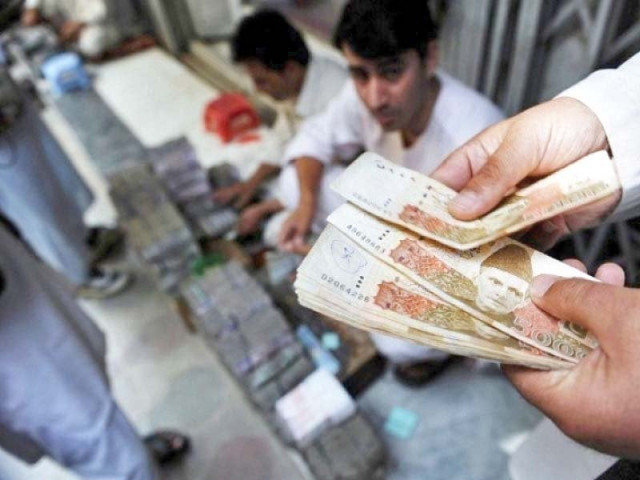Senate panel wants to squeeze salaried class, protect MPs
Recommends up to 100% increase in income tax rates offered earlier by the PM

The PM had also announced increase in the income tax exemption threshold from Rs400,000 to Rs1.2 million. PHOTO: FILE
The Senate Standing Committee on Finance proposed another amendment in the five-point Economic Reforms package Prime Minister Shahid Khaqan Abbasi announced a month ago. In the single largest wage-boosting measure in Pakistan’s history, the premier had announced to increase the income tax exemption threshold by three-fold to Rs1.2 million, and cut the maximum individual income tax rates by 57% from July.
Salaried class to benefit as govt mulls lower income tax rates
The committee has already rejected another reform measure, which was related to acquiring the right to buy private property to discourage tax evasion.
Headed by PPP Senator Farooq H Naek, the standing committee asked the Federal Board of Revenue (FBR) to increase income tax rates for people earning from Rs1.2 million to Rs2.4 million annually to 10%. The proposed increase is 100% more than the 5% rate the PM had suggested for this income group.
The standing committee also recommended the government to increase the income tax rates for people earning from Rs2.4 million to Rs4.8 million annually by 50%, taking it to an overall 15% of income. The PM had announced a 10% rate for this income group. For the people earning over Rs4.8 million annually, the standing committee recommended an income tax rate of 25% as against 15% proposed by the PM. This will increase the tax burden of this class by 66%.
Govt to cut income tax, duty rates in new budget
The FBR will earn an additional Rs20 billion as a result of the rates recommended by the standing committee, said Dr Mohammad Iqbal, Member Inland Revenue Policy of the FBR. The PM’s decision to drastically cut the income tax rates for individuals, both salaried and business income, was aimed at providing a relief of almost Rs100 billion and incentivising people to come in the tax net.
The PM had offered a massive relief, which will adversely hit FBR’s revenues, said Senator Mian Ateeq of the MQM while advocating an increase in income tax rates. Former finance secretary Dr Waqar Masood also advocated the increase in income tax rates for individuals.
The PM had also announced to increase the income tax exemption threshold from Rs400,000 to Rs1.2 million. Subsequently, the FBR managed to impose nominal fixed tax of up to Rs2,000 for Rs1.2-million income earners to retain 521,600 income tax return filers.
Parliamentarians’ interests
The standing committee gave two recommendations for changing tax rates for the textile sector and matchbox manufacturers, which directly related to the business interests of a member of the standing committee.
Senate panel wants to go soft on non-filers in property, car purchases
The standing committee proposed to either impose 10% regulatory duty on the import of cotton from India or reduce synthetic yarn rate that is used as raw material. Currently, cotton is imported from India at 5% duty under the South Asia Free Trade Agreement.
“We have to decide whether Pakistan should support Indian factories by importing finished products at low rates or promote our own industries by making their raw materials cheap,” said Senator Mohsin Aziz of the PTI.
The All Pakistan Textile Mills Association voiced concerns that the import duties on synthetic yarn were higher than finished goods, which was against the cascading principle of taxation. In the cascading principle, raw materials attract lowest duties, the intermediary goods higher duties and the finished goods the highest duties.
Where it observed the cascading principle in case of textile sector, the standing committee violated the same principle while giving recommendations in the case of packaging materials for the dairy sector.
Tetra Pak, which manufactures packaging for milk products, informed the committee that imported packaging materials attract only 16% duty but the raw materials are subject to 21% duty. The company’s representative demanded that the duties on finished goods be increased.
However, the committee did not accept the company’s plea, which was contrary to the position it took in case of cotton where the interests of politicians were involved.
On the suggestion of the matchbox association, the standing committee also recommended the government to change the sales tax collection mode from the wholesale retail point to raw material to protect the formal sector. The recommendation’s language was dictated PTI Senator Mohsin Aziz who has stakes in this sector.
Tobacco sector
The ongoing struggle between those who advocate interests of cigarettes manufacturers and the ones who want to save next generations from smoking related diseases ended on Tuesday when the committee put its weight behind the manufacturers’ lobby.
The standing committee rejected a proposal to end the third tier of federal excise duty on cigarettes, which led to massive reduction in cigarettes prices in Pakistan. Due to the third tier, the average federal excise duty rates are now 45% of the prices - far lower than the global standards of 75%, according to the Ministry of Health Regulation. The official informed the committee that before the introduction of the third tier, the average duties were equal to 65% of the prices.
A member of the standing committee, Senator Dilawar Khan, also deals with tobacco business.
Published in The Express Tribune, May 9th, 2018.
Like Business on Facebook, follow @TribuneBiz on Twitter to stay informed and join in the conversation.

















COMMENTS
Comments are moderated and generally will be posted if they are on-topic and not abusive.
For more information, please see our Comments FAQ